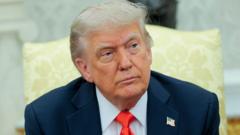Will the Supreme Court Rein in Trump's Power to Fire Top Officials?

Published: 2025-09-22 23:35:13 | Category: wales
The recent ruling by the US Supreme Court has significant implications for presidential authority over independent agencies, allowing President Donald Trump to dismiss a top official from the Federal Trade Commission (FTC). The decision, which was made with a 6-3 majority, opens the door for a broader interpretation of presidential powers in relation to independent commissions, challenging nearly a century of established legal precedent.
Last updated: 17 October 2023 (BST)
Key Takeaways
- The Supreme Court ruled 6-3 in favour of President Trump's authority to dismiss FTC Commissioner Rebecca Slaughter.
- The court will revisit a 1935 precedent that protects independent agencies from presidential interference.
- Justice Elena Kagan warned that this ruling undermines the intended bipartisan nature of independent commissions.
- The FTC typically consists of five commissioners, balancing party representation.
- The ruling may set a precedent for future presidential removals of independent agency officials.
Understanding the Supreme Court’s Ruling
The US Supreme Court's ruling allows President Trump to remove Rebecca Slaughter from her position as a Democratic Commissioner of the FTC while ongoing legal challenges are addressed. This decision has raised concerns about the future independence of regulatory agencies, which were designed to operate free from political influence.
This ruling diverges from the historical understanding established in the 1935 case known as Humphrey's Executor, which limited presidential powers to remove commissioners unless they were guilty of misconduct or neglect. The justices’ decision to hear arguments in December regarding this nearly century-old precedent could reshape the landscape of federal oversight.
The Implications for Independent Agencies
Independent agencies, such as the FTC, were created to enforce regulations and protect consumer interests without direct political pressures. This ruling potentially endangers their operational independence, as it grants the President broader authority to dismiss officials at will. Justice Kagan's dissent highlights the significant risks involved, arguing that the decision undermines the bipartisan structure intended by Congress.
What Led to the Court's Decision?
In March, President Trump dismissed both Slaughter and another Democratic commissioner, Alvaro Bedoya. A federal judge later ruled in favour of Slaughter, calling her dismissal unlawful based on the precedent established in Humphrey's Executor. However, the Supreme Court's temporary order earlier this month allowed the President to proceed with her dismissal, culminating in the final ruling that affirms his authority to act.
Historical Context: The Humphrey's Executor Case
The original Humphrey's Executor ruling set a significant benchmark for the relationship between independent agencies and the presidency. The Supreme Court sided with a commissioner who was dismissed by President Franklin D. Roosevelt, establishing that commissioners could only be removed for specific reasons. This decision has been a cornerstone in protecting the integrity of independent regulatory bodies.
The Legal Battle Ahead
As the Court prepares to review the longstanding precedent in December, the implications of their eventual ruling could reverberate across various independent agencies beyond the FTC, including the Federal Reserve. President Trump has also sought to dismiss Lisa Cook from her role as a Federal Reserve governor, further illustrating the potential for a shift in how independent agencies are governed.
Broader Political Implications
The Supreme Court's ruling could have far-reaching political consequences. If presidents gain unchecked authority over independent agencies, it may lead to increased partisanship and instability within these institutions. Critics argue that this could hinder the agencies' ability to act in the public interest, particularly in areas like consumer protection and financial regulation.
What Happens Next?
As the Court prepares to hear arguments on this issue in December, the legal community and political analysts will closely monitor the proceedings. The outcome could redefine the balance of power between Congress and the presidency concerning regulatory oversight, potentially altering the functioning of independent agencies for years to come.
Challenges Ahead for Regulatory Bodies
Regulatory bodies like the FTC play crucial roles in maintaining fair market practices. The current political climate suggests that these institutions may face challenges in maintaining their independence and effectiveness. As the Supreme Court deliberates on this pivotal issue, the future of regulatory oversight hangs in the balance.
Concluding Thoughts
The Supreme Court's ruling presents a significant pivot point in the relationship between the presidency and independent agencies, raising questions about the future of nonpartisan governance in the US. As the legal battle continues, it remains to be seen how these changes will impact regulatory bodies and their ability to function effectively in safeguarding public interests. Will this ruling lead to a more politically charged atmosphere within independent agencies, or will it ultimately reinforce the need for regulatory integrity? Only time will tell. #SupremeCourt #IndependentAgencies #RegulatoryOversight
FAQs
What is the significance of the Supreme Court ruling on the FTC?
The ruling allows President Trump to dismiss FTC Commissioner Rebecca Slaughter, potentially undermining the independence of regulatory agencies designed to function without political interference.
What was the Humphrey's Executor case about?
The Humphrey's Executor case established that presidents could not remove independent commissioners without just cause, setting a precedent for the protection of independent agencies.
What does this ruling mean for future independent agency officials?
This ruling may open the door for future presidents to dismiss independent agency officials at will, which could lead to increased partisanship and instability within regulatory bodies.
How does the ruling affect consumer protection?
With the potential for reduced independence, the ability of agencies like the FTC to enforce consumer protection regulations may be compromised, affecting market fairness.
When will the Supreme Court hear arguments on the precedent?
The Supreme Court is set to hear arguments on the precedent in December 2023, which could have significant implications for the governance of independent agencies.



